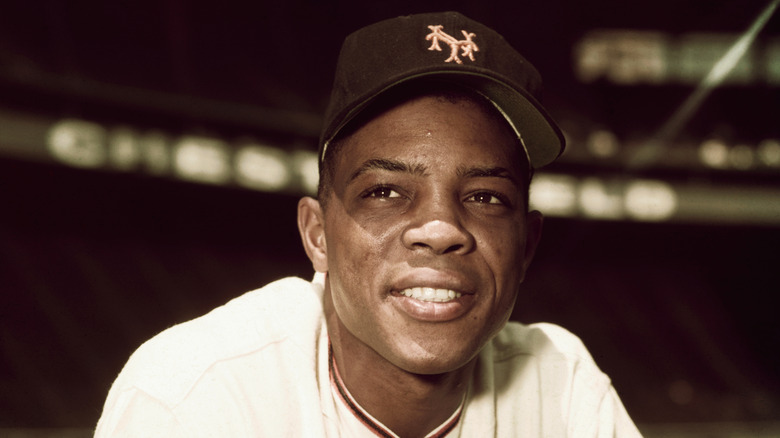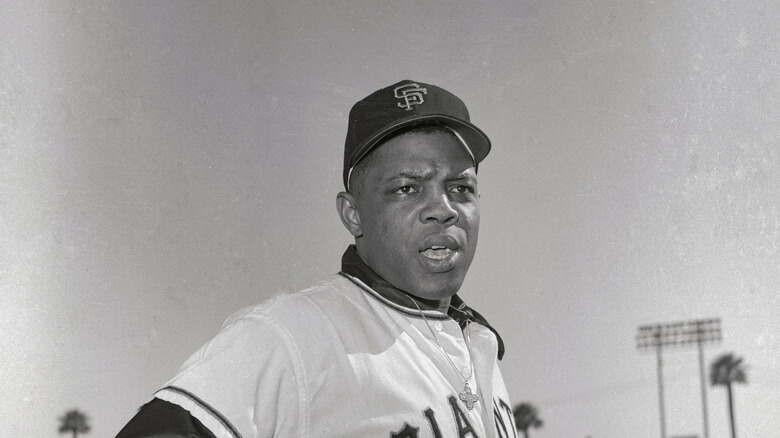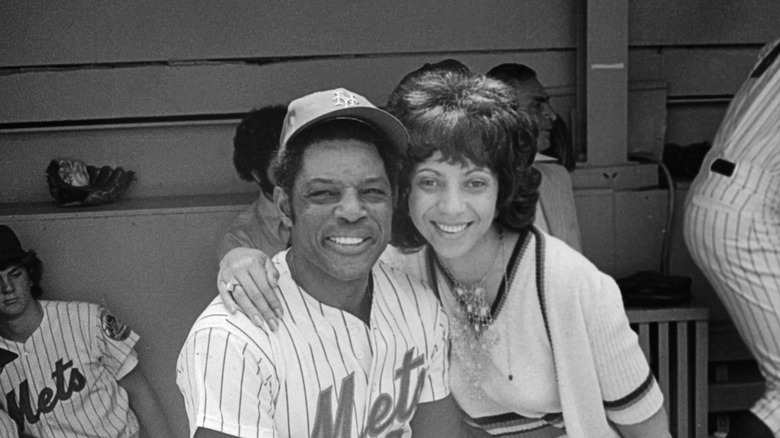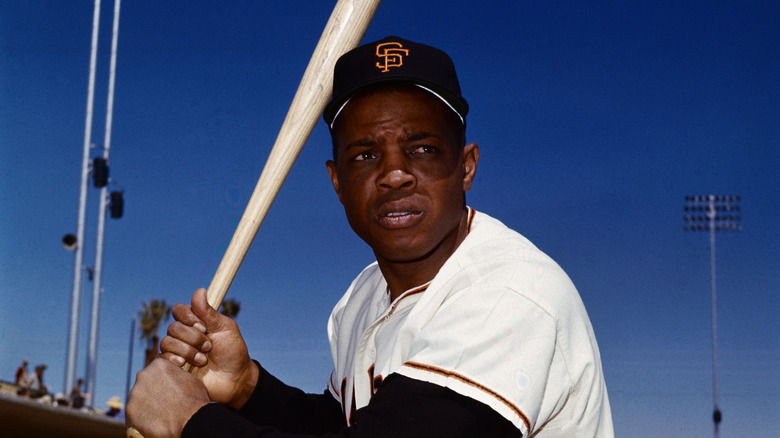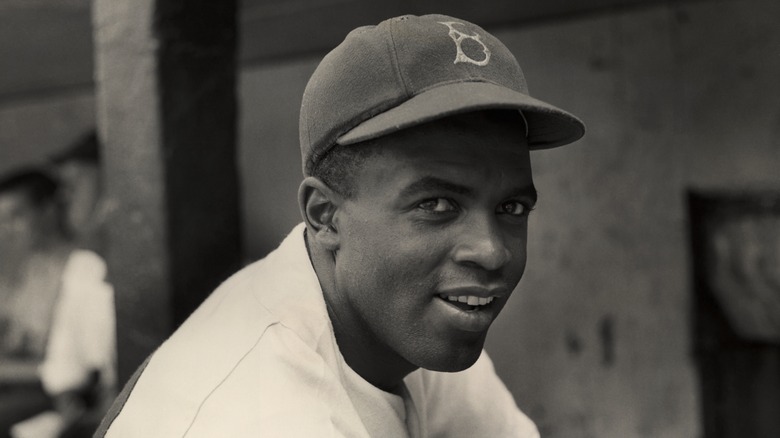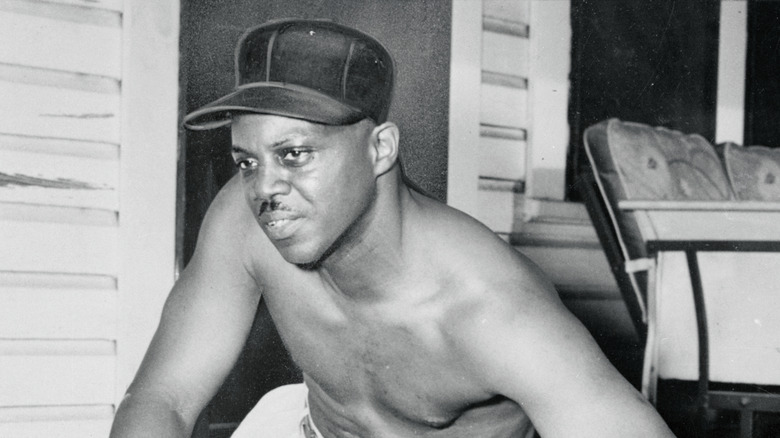The Tragedy Of Willie Mays Explained
On June 18, 2024, baseball legend Willie Mays died at age 93 of natural causes, and he left behind quite the legacy. CBC called him "one of baseball's greatest and most beloved players," and when he died, he was the oldest living Hall of Famer in the sport. Starting professionally in the Negro Leagues in 1948, he signed with the New York Giants in 1950 and made his MLB debut the following year. For most of his 3,005 games he played with the Giants (New York then San Francisco), and he was the first player to hit 300 home runs and steal 300 bases.
Mays had a career batting average of .301 and 660 home runs across 3,293 hits, but his legacy will undoubtedly live strongest through those who saw him play. "If somebody came up and hit .450, stole 100 bases, and performed a miracle in the field every day, I'd still look you right in the eye and tell you that Willie was better," said Leo Durocher, Mays' former manager and fellow Hall of Famer, per MLB. Mays was no stranger to tragedy, though, and he worked hard to become the revered player he was upon his death.
His divorce almost left him bankrupt
Willie Mays married Margherite Wendell in 1956, but it ended in divorce in 1963. In the pre-free agent era, players had no control over the terms of their contracts and made significantly less money. He also received fewer endorsements than his white contemporaries. And according to NBC News, he was "generous to a fault and admittedly careless with money" and "struggled in his post-playing years." Ultimately, many factors contributed to his financial situation, but it was the divorce that left him deep in debt and facing bankruptcy.
Enter Jacob Shemano, a Jewish banker who helped Mays on the condition that he work for free. According to The Forward, Shemano saved the star from bankruptcy, and the pair developed a close friendship that drew the baseball player into the Jewish community. "Anything that we did, Willie was here," Shemano's son, Gary, told the outlet.
His second wife died from Alzheimer's disease
In November 1971, Willie Mays married his second wife, Mae Louise Allen, in Acapulco, Mexico. The pair had been dating on–and-off for 10 years at the time — Mays met her in 1951 and started talking to her in 1961. In 1997, she was diagnosed with Alzheimer's disease, and after 16 years, she died in her sleep in 2013 at age 74. According to "Willie Mays: The Life, the Legend," his wife had a "grace and beauty" that "touched" his "soul."
According to Mays family attorney Malcolm Heinicke, Mae's death was peaceful and painless, but it deeply affected Mays. "Willie is now grieving the loss of his beautiful wife of more than four decades, but he is staying strong by remembering all of the many experiences they enjoyed together," he said (per MLB). "Mae was a beautiful person, and although her illness took some of her memories late in life, Mae passed with full knowledge that Willie loved her dearly. Willie appreciates all of the well wishes of his friends and fans during this difficult time."
Mays was banned from baseball — temporarily
Willie Mays was temporarily banned from baseball in 1979, just three months after he was inducted into the Baseball Hall of Fame. MLB commissioner Bowie Kuhn made the decision after the player left his position as Mets batting instructor for a promotional job at Bally's Casino in Atlantic City. At the time, The New York Times said an "upset and unhappy" Mays spoke to Kuhn and chose to continue working for the casino hotel, effectively leaving the Mets.
Before the ban, Mays' last game with the MLB was in 1973. Speaking to the CBS, Miranda Ayim, former captain of Canada's women's basketball team, said many retired athletes struggle with an "unraveling of that identity," to say nothing of money management issues. After leaving the sport, Mays did public relations for Bally's Park Place. A new commissioner, Peter Ueberroth, was elected to succeed Kuhn in 1984, and he reinstated the star the following year.
Despite initial reports, it seems that Mays was ultimately content with how things played out. "I don't think I did anything wrong to leave baseball," he said, per The New York Times. "It was just a matter of somebody doing something that wasn't right. It's a good feeling to know I can still make a living and go back to baseball." He also said he ”didn't give it a thought" and didn't have time to focus on the sport. "And I wasn't embarrassed by it. If I'd gone to jail, then come back, I would've been embarrassed to have kids see me play. But I didn't do anything wrong."
He faced racism
Unsurprisingly given the time, Willie Mays faced racism during his professional baseball career. In an interview with the Academy of Achievement, he touched on the racism he experienced during his minor league debut in 1950. "I was the first black in that particular league," he said. "And, we played in a town called Hagerstown, Maryland. I'll never forget this day, on a Friday. And, they call you all kind of names there, n***** this, and n***** that."
After retiring he was thrust into the era of the civil rights movement, a time of great social upheaval in America and shifting perceptions of racism in the country. As reported by The Washington Post, fellow MLBer Jackie Robinson — who broke the color barrier by becoming the first Black player in the modern major leagues — frequently criticized Mays for not using his celebrity enough to bolster the movement, calling him a "do-nothing Negro."
In "24: Life Stories and Lessons from the Say Hey Kid," which Mays wrote with biographer John Shea, the star expressed how he felt about the criticisms, which he often ignored. "Jackie did a lot of things for the race," he wrote. "I did what I did. I didn't always go out and talk in the public. Sometimes I'd do it behind the scenes. ... I didn't tell everyone what I did."
He experienced glaucoma like his father
Willie Mays' father, William Howard "Cat" Mays Sr., died in 1999 at age 89 after a short illness. According to "Willie Mays: The Life, the Legend," the pair were close. Cat was a baseball player, too — he retired at 36 when his son was just getting started, and by all accounts was a supportive figure in Mays' life. Per AL.com, he had one principle lesson for the future star: "Just tell the truth and be true to yourself, and you can go on." He attended many of Mays' games with the Giants — until he developed glaucoma, a group of eye conditions that can cause vision loss and even blindness.
Mays, unfortunately, eventually lived with glaucoma as well. "After I retired, I took Willie to the eye doctor several times," MLB Hall of Famer Reggie Jackson told ESPN. "He had early glaucoma." Mays required multiple surgeries throughout his life and struggled with his vision — eventually going blind — until his death in 2024.
